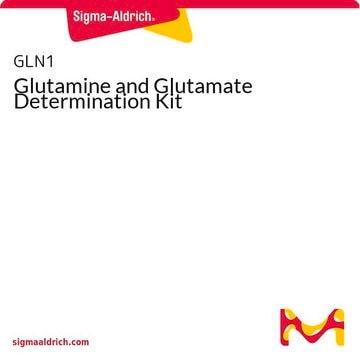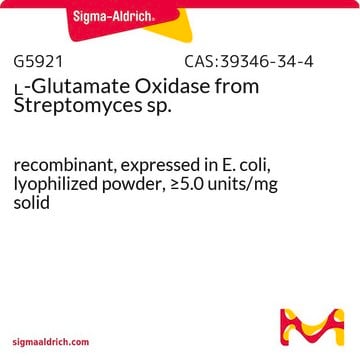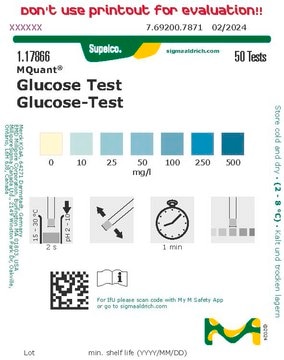MAS004
L-Glutamate Quick Test Strips
Sufficient for 10 tests
Synonyme(s) :
ʟ-Glutamic Acid Quick Test Strips
Se connecterpour consulter vos tarifs contractuels et ceux de votre entreprise/organisme
About This Item
Code UNSPSC :
12352106
Nomenclature NACRES :
NA.84
Produits recommandés
Entrée
beverage(s)
food(s)
Application(s)
food and beverages
Méthode de détection
colorimetric
Température de stockage
2-8°C
Catégories apparentées
Description générale
L-Glutamic acid (L-glutamate), one of the 20 common amino acids, is naturally present in various foods, including cheese, milk, meat, fish, corn, tomatoes, mushrooms, soybeans, and sugar beets. It is also found in processed fruit and vegetables like tomato puree, ketchup, and soy sauce, as well as in condiments, processed meat products such as extracts, bouillon, and sausages, soups, pharmaceuticals, and other materials, including biological cultures and samples. In its free form, L-glutamic acid serves as a major flavor enhancer in foods with a meaty or savory taste. Its role in enhancing the palatability of dishes is utilized through traditional cooking methods that release free L-glutamic acid or through supplementation with monosodium glutamate (MSG).Excessive use of MSG, an E621 food additive commonly found in processed foods, can lead to symptoms like palpitations, severe headaches, nausea, wheezing, and increased body temperature, which are believed to result from the neuro-excitatory properties of free L-glutamic acid. Additionally, glutamate plays a crucial role as a mammalian neurotransmitter and is associated with various neurological and psychiatric disorders, including lateral sclerosis, autism, and Alzheimer′s disease. Furthermore, it functions as a metabolite in cell cultures, where maintaining the glutamate concentration within an appropriate range is essential for optimal cell growth and product formation. For the precise and rapid determination of L-Glutamate, which includes monosodium glutamate or MSG, in food and beverage samples as well as biological samples, Sigma-Aldrich′s L-Glutamate Quick Test Strips provide a simple, reliable, and direct method.
Application
The L-Glutamate Quick Test Strips can be used for determining L-Glutamate levels in:
- Food and Beverage Testing
- Metabolomics Research
Actions biochimiques/physiologiques
Glutamate Quick Test Strips are based on glutamate dehydrogenase catalyzed oxidation of glutamate in which the formed NADH reduces a chromogenic reagent. The intensity of the product color is directly proportional to the glutamate concentration in the sample.
Caractéristiques et avantages
- Fast and Sensitive: Offers rapid results with the flexibility to use 20 or 100 µL of sample for semi-quantitative measurement between 0-300 mg/L (undiluted) L-Glutamate
- Quick Results: Sample treatment and assay can be completed in under 15 minutes, ensuring efficiency
- User-Friendly Design: Convenient test strip design eliminates the requirement for a plate or cuvette reader
Adéquation
This kit is suitable for the detection of L-glutamate in a variety of food and beverage samples.
Principe
The L-Glutamate Quick Test Strips are based on glutamate dehydrogenase catalyzed oxidation of glutamate in which the formed NADH reduces a chromogenic reagent. The intensity of the product color is directly proportional to the glutamate concentration in the sample.
Autres remarques
For additional information on our range of Biochemicals, please complete this form.
Code de la classe de stockage
10 - Combustible liquids
Certificats d'analyse (COA)
Recherchez un Certificats d'analyse (COA) en saisissant le numéro de lot du produit. Les numéros de lot figurent sur l'étiquette du produit après les mots "Lot" ou "Batch".
Déjà en possession de ce produit ?
Retrouvez la documentation relative aux produits que vous avez récemment achetés dans la Bibliothèque de documents.
Notre équipe de scientifiques dispose d'une expérience dans tous les secteurs de la recherche, notamment en sciences de la vie, science des matériaux, synthèse chimique, chromatographie, analyse et dans de nombreux autres domaines..
Contacter notre Service technique



